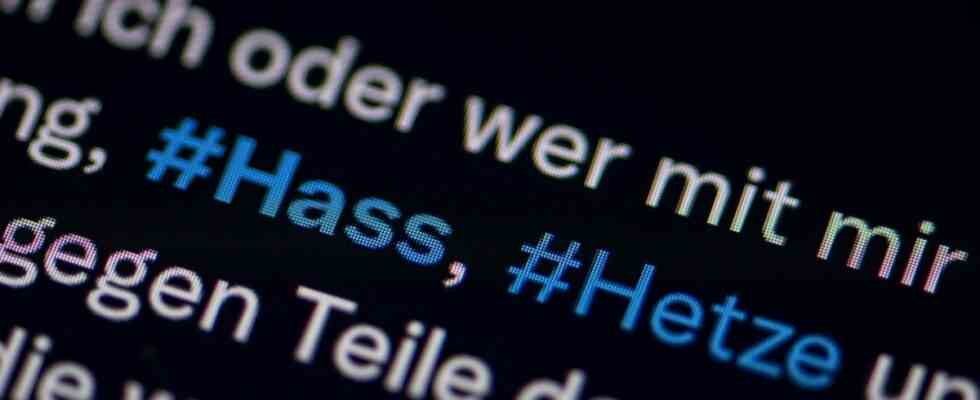A photo of Jens Spahn, then Minister of Health, with the virologist Christian Drosten is the starting point of the crime. At first, the commentators on a social network complained about the mask and the minimum distance, and why it wasn’t visible in the picture. Soon the politician and the scientist will be shot. A man named S., apparently using his real name online, wonders “whether the beads aren’t too good for that”. In any case, he advises: “In the bag and with a stick on it”.
This posting was reported, the District Court of Landsberg am Lech sentenced the author in April 2021 to a fine of 60 daily rates for public incitement to commit crimes. Another example, shared in a larger Whatsapp group: a picture of a cloud of ash, along with the line “a Jewish family photo”. This is hate speech, the 15-year-old user received community service for the photo, which, according to Klaus-Dieter Hartleb, senior public prosecutor and hate speech officer in the Bavarian judiciary, “cannot be surpassed in terms of contempt for human beings”.
Klaus-Dieter Hartleb, senior public prosecutor and hate speech officer of the Bavarian state government, together with Minister of Justice Georg Eisenreich, presented the balance sheet for hate crime on the internet for 2021.
(Photo: Sven Hoppe/dpa)
Two years ago, Minister of Justice Georg Eisenreich (CSU) appointed Hartleb as Germany’s first commissioner for hate speech, i.e. hate speech on the Internet. In addition, special departments were set up in all 22 Bavarian public prosecutor’s offices. Since then, almost 4,000 cases of hate crime have been conducted on the Internet, as Eisenreich announced on Friday in an annual balance sheet for 2021. “Hate and hate speech online have reached an alarming level. A real threat to democracy has developed,” said the minister. And the pandemic has exacerbated this. According to Hartleb, this acted “like a fire accelerant”. In addition to politicians, doctors would also be addressed.
In 2021, 2,317 new cases of hate speech were conducted in Bavaria (1,881 against known suspects and 436 against unknown persons); an increase of 41 percent over the previous year. Public charges were filed in 450 cases, including 112 indictments, 300 applications for penal orders and 38 applications for simplified juvenile proceedings. A judgment or penal order was issued 332 times, 269 are already final. 571 proceedings were discontinued because the perpetrators could not be identified or because there was insufficient suspicion.
According to Eisenreich, even if a posting is completely off the mark or repugnant, it does not automatically mean that the limit of what is punishable has been crossed. “Freedom of expression ends where criminal law begins.” Insults, defamation, incitement to hatred or the use of symbols of unconstitutional organizations are typical offenses in the case of hate speech online.
The 2021 statistics provide the first insights into the motivation for the crime, insofar as it can be determined: Of the 2,317 investigations, 347 crimes were xenophobic, 218 anti-Semitic, 83 misogynist, 86 because of sexual orientation or sexual identity, 46 Islamophobic, 25 anti-disabled and six anti-Christian. “The numbers show that anyone can become a victim of hate and hate speech,” said Eisenreich.
Politicians are also affected at the municipal level, often women. Munich Attorney General Reinhard Röttle, who is responsible for the hate speech officer, referred to the “silencing effect” documented in studies. According to this, quite a few local politicians are reluctant to go online because of hostility towards themselves or their families online – or are considering giving up their mandate.
In the fight against hate speech, the ministry has set up online reporting procedures with various cooperation partners, and a platform for all citizens is planned. To this end, Eisenreich relies on prevention in the youth field. He called on platform operators to cooperate if there was a request for information from the judiciary; Facebook was specifically reprimanded. Green party leader Katharina Schulze called for even better technical and human resources for law enforcement agencies and courts. Hate speech must also be dealt with in more detail in legal training.

